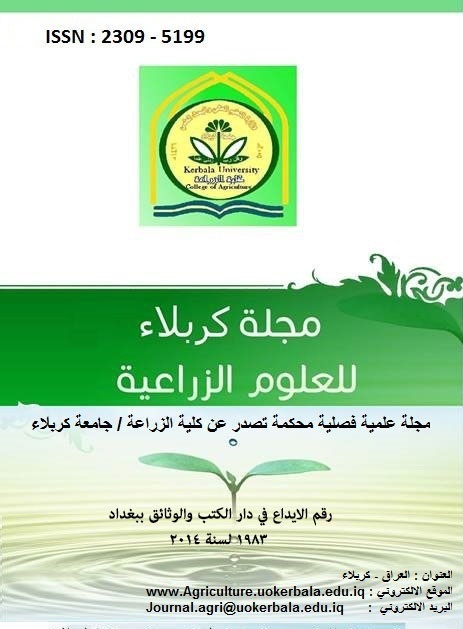Effect of transglutaminase enzyme treatment on some rheological properties for the Iraqi wheat flour of Al-Rasheed class
DOI:
https://doi.org/10.59658/jkas.v3i4.561Abstract
The current study was undertaken to explore the possibility of improving chemical and rheological properties of Iraqi wheat flour dough (Al-Rasheed Class), by adding bacterial transglutaminase enzyme. The flour used currently was poor quality, as the development time and stability of the dough were low and the greatest viscosity was up from the normal limit of the flour suitable for the bread industry. The extension resistance, extensibility, extensograph area as well as the protein percentage was low. The flour treated with different concentrations of transglutaminase enzyme (10, 30, 50, 100 and 150 units /100 gm flour). Greater extension resistance, extensograph area and greatest resistance were obtained using 30 unit /100 gm flour transglutaminase as compared with the control and remaining treatment. Moreover, 50 unit/100 gm flour of transglutaminase revealed a significant increase in strong and dry gluten content. Flour treated with all transglutaminase concentration exhibited the significantly greater gluten index.
Downloads
Published
How to Cite
Issue
Section
License
Copyright (c) 2016 Journal of Kerbala for Agricultural Sciences

This work is licensed under a Creative Commons Attribution 4.0 International License.
Licensing Terms
All articles are published under a Creative Commons License and will be directed to the Creative Commons Attribution 4.0 International License That permits use, distribution, and reproduction in any medium, provided the original work is properly cited and is not used for commercial purposes.
Use by non-commercial users
For non-commercial and non-promotional purposes individual users may access, download, copy, display, and redistribute the articles to colleagues, as well as adapt, translate, text- and data-mine the content subject to the following conditions:
- The author's moral rights are not compromised. These rights include the right of "paternity" (also known as "attribution" - the right for the author to be identified as such) and "integrity" (the right for the author not to have the work altered in such a way that the author's reputation, or integrity may be impugned).
- Where content in the article is identified as belonging to a third party, it is the obligation of the user to ensure that any reuse complies with the copyright policies of the owner of that content.
- If article content is copied, downloaded, or otherwise reused for non-commercial research and education purposes, a link to the appropriate bibliographic citation (authors, journal, article title, volume, issue, page numbers, DOI, and the link to the definitive published version on JKAS website) should be maintained.
- Copyright notices and disclaimers must not be deleted.
- Any translations, for which a prior translation agreement with JKAS has not been agreed, must prominently display the statement: "This is an unofficial translation of an article that appeared in an FSP publication. The publisher has not endorsed this translation."
Use by commercial "for-profit" organizations
Use of JKAS Open Access articles for commercial, promotional, or marketing purposes requires further explicit permission from JKAS (journal.agri@uokerbala.edu.iq) and will be subject to a fee.
The commercial purposes include:
Copying or downloading of articles, or linking to such articles for further redistribution, sale, or licensing; Copying, downloading, or posting by a site or service that incorporates advertising with such content; The inclusion, or incorporation of article content in other works, or services (other than normal quotations with an appropriate citation) that is then available for sale or licensing, for a fee (for example, a compilation produced for marketing purposes, inclusion in a sales pack); Use of article content (other than normal quotations with appropriate citation) by for-profit organizations for promotional purposes; Linking to article content in e-mails redistributed for promotional, marketing or educational purposes; Use for the purposes of monetary reward by means of sale, resale, license, loan, transfer or other form of commercial exploitation such as marketing products; Print reprints of articles can be purchased from journal.agri@uokerbala.edu.iq.
Permissions
- No special permission is required to reuse all, or part of the article published by JKAS, including figures and tables for non-commercial purposes.
- Any part of the article may be reused, for non-commercial purposes, without permission provided that the original article is cited.
- Reuse of an article does not imply endorsement by the authors, JKAS

